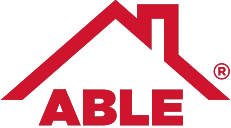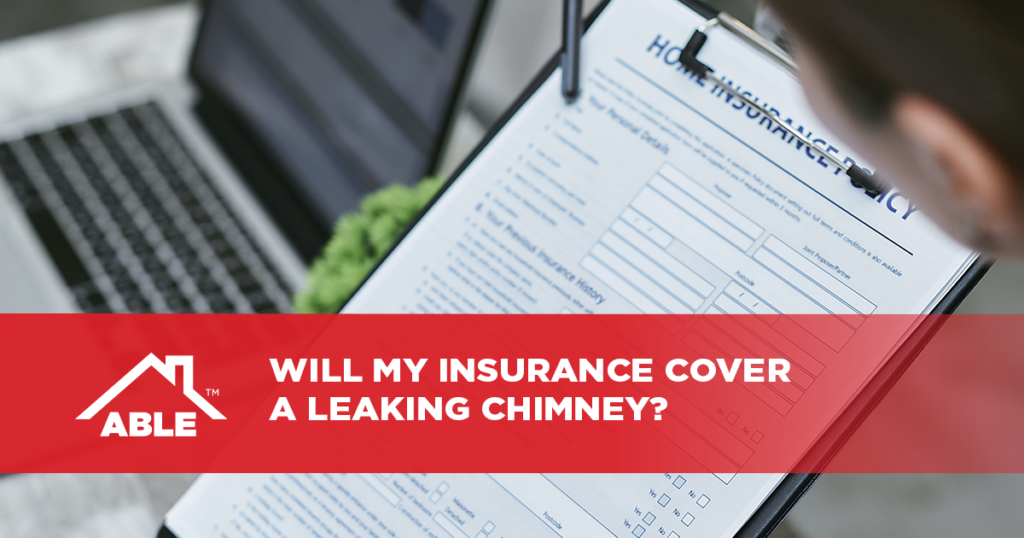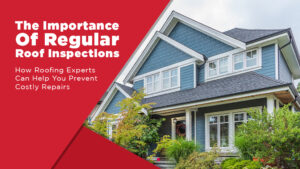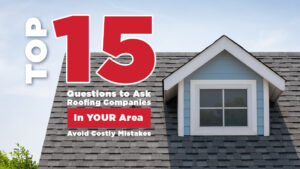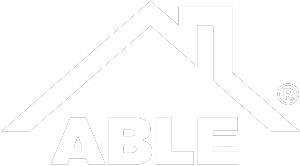Although it’s important that chimney repairs are taken care of as quickly as possible, these jobs can also be expensive. The longer you wait to address an issue like a chimney leak, however, the more property damage could occur. This could include mold, rotting wood, and other kinds of water damage, for instance.
If you can’t afford to pay for chimney repairs out of pocket, you’re probably hoping that your insurance policy can cover the service.
Does homeowner’s insurance cover leaky chimneys?
With a standard homeowner’s insurance policy, some chimney leaks may be covered, while others won’t be. It really depends on what caused the leak to develop in the first place. If your chimney is leaking because of a sudden and unforeseen event, then it’s likely to be covered by a standard insurance policy. “Sudden and unforeseen events” could include falling tree branches, strong winds, lightning strikes, and similar mishaps.
However, leaky chimneys don’t always develop due to an accident. It’s also possible for a chimney to begin leaking because of the wear and tear that simply comes with age. Aging can cause certain components of your chimney (such as the chimney cap, flashing, and crown) to start allowing water or moisture into your house. If this is the cause of your leak, then it probably isn’t going to be covered by your homeowner’s insurance policy.
If you’d like your insurance claim to succeed, you’ll need to demonstrate to the insurance company that the leak was caused by unforeseen damage rather than poor maintenance or negligence. These circumstances will lead to your claim being denied, and you may be left paying for chimney repairs out of pocket.
Can I file an insurance claim if there’s a leak in my basement fireplace?
Insurance providers also treat leaky chimneys a bit differently when the fireplace is located in the homeowner’s basement rather than on an upper floor of their house. If the fireplace is found below ground level, you’ll be covered if the leak is caused by a burst pipe. You’ll probably also receive insurance coverage if an appliance (such as tub, sink, or hot tub) overflows, leading the basement fireplace to undergo water damage.
However, if the basement chimney was damaged by water seeping through the floors or walls, this generally isn’t covered by the homeowner’s insurance policies. Leaks or water damage caused by a sewer backup are also unlikely to be covered by your provider.
How do I build a case if I have a chimney leak?
As we mentioned, you need to build a case proving that the chimney leak was caused by unforeseen damage, such as weather-related issues. If you can’t successfully prove this to the insurance provider, your claim will almost certainly be denied.
It can be difficult to uncover and prove the cause of your chimney leak on your own, however. The best way to build your case is to hire a professional chimney or roofing contractor to inspect your damaged chimney.
Then, after a specialist has performed a thorough inspection of your leaky chimney, they can provide you with a detailed report. This report will include information about the leak’s extent or severity, its cause (paired with photographic evidence), and an estimate of how much the repair job will cost.
To make your case as strong as possible, you shouldn’t end there. After the inspection is complete, see if you can find any past paperwork from chimney inspections, cleanings, repairs, and other services that you’ve previously received. These documents can help demonstrate to your insurance provider that you’ve been adequately maintaining your chimney. If the leak was caused by a lack of maintenance, the repair costs won’t be covered by the insurance company.
Now that you’ve gathered all these documents and information, it’s time to move forward with your claim. After filing your claim, you don’t need to wait until it’s accepted to repair your chimney and the subsequent water damage. You can bring in a contractor to perform the repairs, and if you hang onto all the receipts and invoices you receive, it’s possible to be reimbursed by your insurance provider later.
Is it worth making a claim for a leaky chimney?
On the surface, the insurance claims process can seem daunting. This might lead some homeowners to forgo it entirely, paying for the repairs out of pocket or failing to address the chimney damage at all.
If you’re dealing with minor water damage, it may not be worth it to file a claim with your insurance provider. When the cost of repairs ends up being less than the deductible, you may be better off just paying for the job yourself.
Filing an insurance claim isn’t without risk – insurers in the United States will sometimes drop homeowners for filing claims, whether those claims are big or small. So, it’s a good idea only to file a claim when it’s necessary.
The insurance industry keeps a database of claims that have been previously filed. If you end up losing your current insurance provider, it may be difficult to find a new one. Prior to filing a claim for a leaky chimney, make sure that you’ve weighed the pros and cons. Afterward, if you still believe that it’s worth the risk, then go ahead and file the claim.
Why you should keep moisture out of your chimney
Even if you’ve noticed a leak in your chimney, you may not be in a rush to have it repaired. When the leak is minor, it can be easy to ignore it and put off hiring a contractor. But the longer you wait to have the chimney leak repaired, the more severe the damage can become. More severe water damage also means more expensive repairs.
Moisture can be extremely damaging to your home’s chimney, even in small amounts. For example, moisture can lead to decaying mortar. When rainwater makes its way into your chimney, this moisture can cause the mortar to begin decaying or become damaged.
If your mortar joints are intact, there won’t be any gaps for water to slip through and into your home, causing a leak.
Of course, that’s not the only damage that can be done by allowing moisture into your chimney. If a leak isn’t addressed quickly, homeowners could also be faced with chimney deterioration and interior water damage. When deterioration becomes severe enough, this could lead to bricks crumbling and even a collapsed chimney.
In addition, when a chimney leak is left unchecked, the water can mix with creosote. Creosote is composed of hundreds of chemicals. This substance comes in the form of an oily, thick liquid that’s highly flammable. Not only that, but creosote can be dangerous to human health.
When water begins mixing with creosote in your chimney, it will lead to a very strong and unpleasant odor. This smell can quickly take over your home.
Preventing chimney leaks
The best way to avoid filing an insurance claim for a chimney leak is simple: make sure that you’re staying on top of chimney maintenance and upkeep. This way, even if a leak does form,
Periodically, your home’s chimney should receive an inspection and preventative maintenance. You’ll need to call in a professional roofing or chimney contractor to handle this job. If the specialist finds anything of concern, this will give them the chance to intervene early while the damage is still minor. Chimney damage is notorious for worsening over time, and minor problems aren’t always obvious to the untrained eye.
Aside from receiving inspections, you should be taking a few preventative measures to reduce your risk of a chimney leak. To start, make sure that you’re caring for your chase cover or chimney crown. Assuming that your chimney crown is well-built and properly maintained, it will stop water from pooling on the surface of your chimney. It will also prevent water from penetrating and causing damage to certain parts of the chimney, such as the region between the masonry and flue.
Also, your chimney’s flashing should remain watertight at all times. Flashing is the metal seal that is found between your chimney and rooftop.
Whenever the flashing is improperly installed or damaged, it can no longer prevent water from running down the chimney. This rainwater, snow, or other types of moisture will then end up in your living space. This can even lead to ceiling damage, wall damage, or rot in your home’s rafters.
Leaky chimney repairs by Able Roof
After you’ve filed an insurance claim, the next step is to hire a trusted chimney contractor in your area. The team at Able Roof is highly experienced in repairing chimney damage, including damage associated with leaks. We’ll find the cause of the leak and repair the issue at its source. Remember, chimney leaks aren’t a minor issue – they can lead to serious damage, especially if you wait to receive repairs.
To receive a free, no-obligation estimate from the contractors at Able Roof, just fill out our digital form today.
